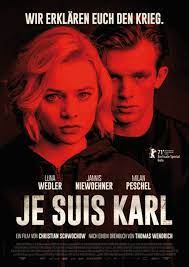
JE SUIS KARL
Germany, 2021, 126 minutes, Colour.
Luna Wedler, Jannis Niewohner, Milan Peschel, Edim Hasanovic, Anna Fialova, Fleyr Geffrier, Aziz Dyab.
Directed by Christian Schwochow.
This is a drama concerned with right-wing movements in continental Europe, especially among the younger generation. By the mid-2010s, there were vast numbers of refugees coming from Syria, Afghanistan as well as from Africa. Angela Merkel welcomed them to Germany but there was great opposition.
This film opens with an act of terrorism, a box with an explosive carried into an apartment block and exploding, killing members of the family, destroying the building. We have been introduced to the mother and father of the family, cheerful on holidays smuggling in a refugee to Berlin. Then there is the introduction to their daughter, Maxi (Luna Wedler) coming from a summer camp, meeting up with her younger twin brothers. The father survived because he had gone out to his car to get groceries. The daughter survives because she had gone to see a friend.
The film then focuses on the daughter, pursued by media, sheltered and taken in for a coffee by a young man on the street, Karl. He is charming, invites her to a Convention in Prague and, after clashing with her father, she decides to go.
Karl (Jannis Niewohner) is a leader of a revolutionary protest movement against governments in Germany and all over France, setting up meetings, rallies, aligning himself with a French candidate, reminiscent of Marie Le Pen. We see his other associates, from different countries in Europe, fanatical in their expressions. Whereas, Karl is rather quiet in his intensity. And, the audience realises that it is he who planted the bomb. That his group is unscrupulous in creating situations to rouse up prejudice against foreigners and refugees.
Maxi falls in love with Karl, agrees to speak at rallies, identifying with his cause. However, the refugee helped by her father turns up, phones Maxi and discovers where she is, he and her father driving to Strasbourg to the rally.
Karl is so intent on his cause, radicalised, that, like a suicide bomber, he is prepared to die for his beliefs – with one of his associates set to assassinate him, shoot him.
This does happen, has quite an effect on Maxi, and the finale is their travelling through tunnels to escape riots and random shootings in the street, to where…?
The next film by the director, Christian Schochow, was Munich – The Edge of War, a dramatisation of Hitler and his ambitions, Chamberlain going to Munich, but with a fictitious subplot including the young German, played by the star of Karl, and George MacKay with Jeremy Irons as Chamberlain.
- The title, memories of terrorist activities in Europe, Paris, identifying with key people and movements?
- The German film, German perspective on Europe, the 2020s, the refugee movements, multi-ethnic refugees, traditionalist Europeans, racial stances? Organisation, politicians t 27 o the Right? The tactics of the opposition, suicide for a cause mentality, indoctrination and radicalisation?
- The introduction to the family, Maxi and her arrival home, her parents, love, their smuggling the refugee into Germany? The twin brothers? Family life, Alex and his carrying in the parcel, his return to the car, the explosion, the deaths, hospital, Maxi surviving? The impact on each of them? The return to the apartment? Alex living by himself, morose and isolated? Maxi defying her father, leaving?
- Maxi and the press following, her upset, the encounter with Karl, helping her, the conversation, the invitation to Prague? The clash with her father, her decision to go?
- Karl, the audience realising that it was he who had the bomb? His charm, yet callous, means to an end? Obsessed by his goal? Racial superiority? The purification of Europe, the European traditions? His followers, Jitka and her intensity? The young men from Eastern Europe? His talk, motivations?
- The rally, the crowds, the young people, the friendliness, the woman shouting Sieg Heil? Karl’s reaction? The reaction of the crowd? The gradual revelation of the motivations, the speeches, indication of terrorism, refugee terrorists? Maxi and her listening, attracted to Karl, joining in, his using her and her story, her emotional speech?
- Odile, memories of Marie Le Pen in France, a politics, her appeal, candidature, at the rallies? Friendship with Karl, relying on him?
- Karl and the personal side, his friends, Jitka, her warning about falling in love with Maxi? The love, the encounters, the effect on Maxi? And her willingness to give a speech?
- The police in Berlin, interrogations, Alex and his remembering the refugee, reporting him to the police, his arrival, Alex’s embarrassment, the memories of the past, his bringing Maxi, her giving him the information? Alex and Yussuf driving to Strasbourg?,
- Karl and his plan, the suicide bomber mentality, willing to sacrifice himself, Jude, willing to shoot him?
- The rally, the crowds, The deal, Maxi and her speech, Karl? Going to the restaurant?
- Alex and Yussuf arriving, Alex and his search, seeing Max in the restaurant, getting in, witnessing the shooting of Karl? The aftermath, Maxi going to him? Yussuf in the car, the rallies, the crowds, the shootings, the burning of the cars?
- The impact on Alex, the impact on Maxi, what she had gone through? Yussuf and the escape through the tunnel in the long take leaving the audience to reflect on what they have seen and heard?